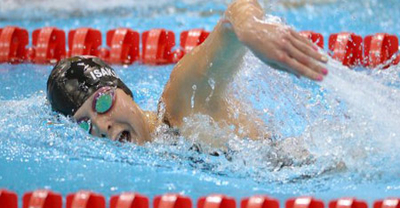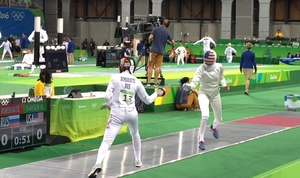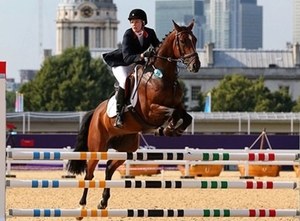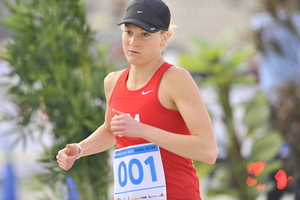A Day In The Life of a Modern Pentathlete: Margaux Isaksen (USA)
Modern Pentathlon is a sport that tests the mind and body to the limit, enforcing a change in mindset five times a day.
So how does the brain work as the pentathletes switch from discipline to discipline, and how do they stay in control?
We asked Margaux Isaksen of the USA, who finished 4th at the London 2012 Olympic Games, and Arthur Lanigan O’Keeffe of Ireland, the 2015 European champion, what goes through their mind and how they control their body during this energy-sapping, mentally-draining event.
On the day the women's medals will be decided at the Rio 2016 Olympic Games, we hear from Margaux Isaksen (USA).
The Morning
I always start the day with a lot of coffee and a good breakfast. Something filling but something that won't make my stomach feel heavy. Coffee is key. After breakfast I usually put some music on and try to start getting pumped up. If I've prepared properly, competition day is usually a combination of tactics and state of mind. Being ready to attack the water when the buzzer goes off is crucial. I like to get in a longer warm-up than most.
 The Swim
The Swim
When I’m on the blocks and about to dive in for the swim, I’m telling myself: This is going to hurt, and that's okay.
I'm sure every athlete feels differently, but I am usually racing against myself. Sure, it's great to have someone to push you, but often their tactic might be a little different. I try to stay really relaxed the first 50m. I'm a much better distance swimmer, so the second 100m is usually where I make up ground.
I start to add the second 50m, but when I turn at the 100m mark, that's go time. I try to remember to keep a good body position. Collapsing will just add more drag. The third 50m is the hardest. I usually imagine that 150m is the finish line. The last 50m is just running on fumes. I give it everything I have left and know the pain will eventually end.
 The Fence
The Fence
Fencing requires a different state of mind. Again, coffee is key! I try to stay as relaxed as possible before I fence. Calming music, lots of laughter and jokes. I fence better if I am enjoying myself. When the mask goes on, I'm hyper focused for that one minute. Then I need a little break to laugh it off. After all, if you're not enjoying it, why are you there? I find my best competitions are those where I find the balance between intensity and enjoyment.
 The Ride
The Ride
Where do I begin? It's terrifying and liberating all at the same time. You have 20 minutes to familiarize yourself with a horse you've never even seen before. Sometimes the odds are in your favor, and sometimes they are not!
My nervousness not only comes from the usual competition jitters, but also from the fear that your horse might spook, or any number of possible scenarios that could play out. You're working with a beautiful animal that also had a mind of its own. That's why those 20 minutes are key. You have to create a partnership. You have to learn how your horse will react in different situations, and the horse has to learn to trust you.
I love animals, and I love the riding component of pentathlon. I usually bribe my horse with treats and lots of pats. I've always thought the horse can feel your personality. I try to be as kind as loving to my horse as possible, and in return they give me their best.
The moment you ride into the stadium is breathtaking. It's nerve wracking, terrifying, and exciting all at the same time.
 The Combined Event
The Combined Event
Wow. This is where my nerves take an entirely new form. It's the 'grand finale' if you will. As I step on the start line I usually question why I've done this to myself! Sometimes I think I'll just go home.
Running is usually my best event, but it's also paired with my weakest event (shooting). I have this weird mix of emotions. I visualize how I want to execute each shot, and how it will feel crossing the finish line in first. It's what I've been training for. This moment. And when the gun goes off all the nerves go out the window.
Running when I'm in shape is the best feeling in the world. I feel invincible. Of course there comes a point when you're in so much pain, and you're so tired, and in that moment you can give up, or push harder. Usually I choose the second option, but I feel like every athlete fights with himself or herself more than their competitors. You choose to push yourself harder when your body is telling you to quit. I never want to finish a race knowing I could have done more.
Anyone would be lying if they said they didn't watch their position. We all do it. Knowing there is someone at your heels can give you that extra motivation you need. At the shooting range it's a different story. It's incredibly difficult to block everything out, but you have to.
You can't take your focus off the sights. You have to execute each shot in exactly the same way as the previous one. It's hard when you know a crowd is watching you, or if you know you have to get that last shot to win the race, but that's what we train for. We train our minds as much as our bodies.
The aftermath
I don't get people who fall over at the end. I usually just put my hands on my knees and wait there for a second. OK, so that’s not entirely true! But we compete all day. Give it everything in four events. It is exhausting. But that's the nature of sport.
Recovery is key. My usual ritual would involve a recovery drink post race, and a healthy, hearty dinner with a hefty amount of carbs. Ice baths and massages are usually in the mix. Post-Olympics however, I'm going to treat myself and go straight for the pizza!
All results from the Rio 2016 Olympic Modern Pentathlon competition can be found here.
If you have any questions about the format of the competition we answer them in this essential guide.
To find out which broadcaster is covering the Games live on TV in your country, follow the link on this page.



